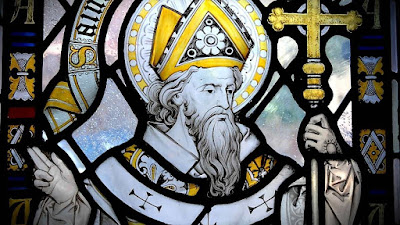St. Ambrose, Bishop and Doctor of the Church
 On December 7th, the Church observes the memorial of Saint Ambrose, the 4th century bishop and Doctor. One of the most important prelates and influential theologians in the early Church, he is acclaimed in the West as a Father of the Church. Ambrose was born at Treves in Gaul, a territory which encompassed modern France, Britain, Spain, and part of Africa. He completed his studies in Rome and later became governor of Liguria and Aemelia with residence at Milan.In the year 370, in his capacity as governor, Ambrose tried to resolve a heated dispute over who would ascend to the episcopacy of Milan. His words struck such a chord in people that someone shouted out that Ambrose should be bishop. Ambrose had no intention of being a priest or a bishop. He was still a catechumen who was preparing for baptism. But the people prevailed and by popular assent, Ambrose was baptized and then consecrated bishop of Milan the following week.His judicious administration proved to be very effective, and it was through his preaching that the great Saint Agustin renounced his heresies and worldly living to become a Christian. Perhaps his most courageous act was to excommunicate the Emperor Theodosius who had massacred 7,000 people in Thessalonica in response to the Roman governor’s assassination. Theodosius was made to do public penance four months before he was readmitted to the sacraments. To justify this action St. Ambrose said, "The Emperor is in the Church not over it."A brilliant theologian, Ambrose wrote much on the Sacred Scriptures and Fathers, preached a homily every Sunday, resisted the interference of the secular powers with the rights of the Church, opposed the heretics, (most notably Arianism) and worked heroically to unite the Church. He died peacefully on April 4, 397. His earthly remains may still be venerated in the church of Sant'ambrogio in Milan.We often meet St. Ambrose in the Divine Office as a teacher and as an inspired composer of hymns (fourteen of the hymns attributed to the saint are definitely authentic, true pearls of religious poetry). His writings are vibrant with ancient Christian liturgical spirit, for his life was wholly rooted in mystery and sacrament. We can profit greatly by reading Ambrose's works. He is one of the four great Latin Doctors of the Church. St. Ambrose, teacher of the true Faith, pray for us.
On December 7th, the Church observes the memorial of Saint Ambrose, the 4th century bishop and Doctor. One of the most important prelates and influential theologians in the early Church, he is acclaimed in the West as a Father of the Church. Ambrose was born at Treves in Gaul, a territory which encompassed modern France, Britain, Spain, and part of Africa. He completed his studies in Rome and later became governor of Liguria and Aemelia with residence at Milan.In the year 370, in his capacity as governor, Ambrose tried to resolve a heated dispute over who would ascend to the episcopacy of Milan. His words struck such a chord in people that someone shouted out that Ambrose should be bishop. Ambrose had no intention of being a priest or a bishop. He was still a catechumen who was preparing for baptism. But the people prevailed and by popular assent, Ambrose was baptized and then consecrated bishop of Milan the following week.His judicious administration proved to be very effective, and it was through his preaching that the great Saint Agustin renounced his heresies and worldly living to become a Christian. Perhaps his most courageous act was to excommunicate the Emperor Theodosius who had massacred 7,000 people in Thessalonica in response to the Roman governor’s assassination. Theodosius was made to do public penance four months before he was readmitted to the sacraments. To justify this action St. Ambrose said, "The Emperor is in the Church not over it."A brilliant theologian, Ambrose wrote much on the Sacred Scriptures and Fathers, preached a homily every Sunday, resisted the interference of the secular powers with the rights of the Church, opposed the heretics, (most notably Arianism) and worked heroically to unite the Church. He died peacefully on April 4, 397. His earthly remains may still be venerated in the church of Sant'ambrogio in Milan.We often meet St. Ambrose in the Divine Office as a teacher and as an inspired composer of hymns (fourteen of the hymns attributed to the saint are definitely authentic, true pearls of religious poetry). His writings are vibrant with ancient Christian liturgical spirit, for his life was wholly rooted in mystery and sacrament. We can profit greatly by reading Ambrose's works. He is one of the four great Latin Doctors of the Church. St. Ambrose, teacher of the true Faith, pray for us.
